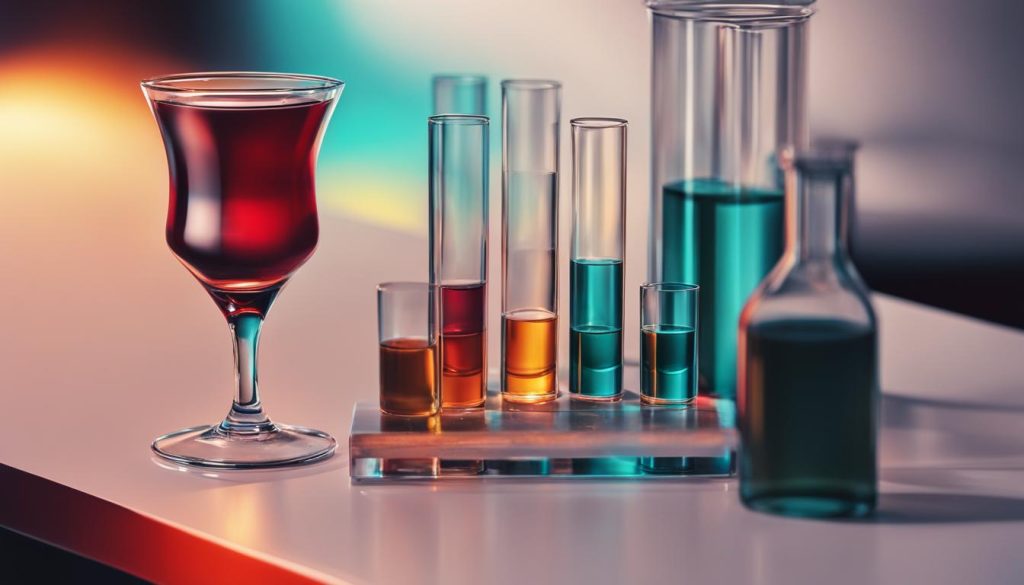Ad Blocker Detected
Our website is made possible by displaying online advertisements to our visitors. Please consider supporting us by disabling your ad blocker.
Welcome to our comprehensive guide on boosting testosterone and enhancing sex drive naturally. In this article, we will delve into evidence-based strategies that can help increase testosterone levels and improve sexual well-being. Whether you’re looking to enhance muscle development, improve libido, or boost overall sexual performance, our guide is here to provide you with actionable steps and natural remedies to achieve your goals.
Testosterone is a steroid hormone that plays a crucial role in sexual function and overall health. Optimal levels of testosterone are essential for both males and females, influencing muscle development, voice changes, hair growth, and sexual well-being. By implementing the strategies we discuss, you can naturally increase testosterone levels and revitalize your sex drive.
Key Takeaways:
- Testosterone is vital for sexual function and overall health.
- Natural remedies can help increase testosterone levels and enhance sex drive.
- Exercise, nutrition, stress management, and adequate sleep all play a role in optimizing testosterone levels.
- Supplements, vitamin D, and minimizing exposure to estrogen-like chemicals can further boost testosterone levels.
- Moderate alcohol consumption and addressing psychological factors can improve libido.
The Importance of Testosterone Levels
Testosterone is not only important during puberty but also throughout adulthood. In adult males, healthy testosterone levels are vital for general health, including disease risk and sexual function. Low testosterone levels can lead to low libido, erectile dysfunction, and other sexual problems. Testosterone also plays a significant role in female health and sexual well-being. Maintaining optimal levels of testosterone is crucial for overall sexual health and performance.
Exercise and Testosterone
When it comes to naturally increasing testosterone levels, exercise is a powerful tool. It has been proven to have a positive impact on testosterone production, making it one of the most effective methods to boost your sex drive.
Weightlifting and resistance training are particularly beneficial for increasing testosterone levels. These types of workouts stimulate muscle growth and strength, which in turn enhances testosterone production. Incorporating high-intensity interval training (HIIT) into your routine is also an effective way to boost testosterone levels and improve overall sexual health.
Regular physical activity not only increases testosterone levels, but it also promotes muscle mass and strength. This can significantly improve your sex drive and overall sexual performance. So, lace up your sneakers and hit the gym for a natural testosterone boost!
Nutrition and Testosterone
A balanced diet plays a crucial role in supporting healthy testosterone levels and optimizing sexual health. By incorporating the right nutrients into our daily meals, we can help maintain testosterone levels, aid in fat loss, and promote overall well-being. Here’s a breakdown of the key components that can positively impact testosterone production:
Protein
Consuming enough protein is essential for maintaining healthy testosterone levels. Protein-rich foods provide the building blocks for hormone production and muscle development. Aim to include lean sources of protein such as chicken, fish, eggs, and legumes in your diet. Additionally, consider incorporating high-quality protein supplements like whey or plant-based protein powder for convenience and to ensure adequate protein intake.
Healthy Fats
Healthy fats are crucial for supporting testosterone production. They help in the synthesis of hormones and provide energy for bodily processes. Include foods rich in monounsaturated and polyunsaturated fats like avocados, nuts, seeds, and olive oil in your diet. These fats not only support testosterone levels but also have a positive impact on heart health and overall well-being.
Carbohydrates
Carbohydrates are essential for providing energy to the body. Opt for complex carbohydrates like whole grains, fruits, and vegetables, as they provide a steady release of energy and essential nutrients. Adequate carbohydrate intake ensures that the body has enough energy to support testosterone production and maintain optimal sexual health.
Avoiding a low-fat diet is crucial, as it may negatively impact testosterone levels. Healthy fats are necessary for hormone production, and consuming a well-rounded diet that includes protein, fats, and carbohydrates helps optimize hormone levels and enhance sexual health.
| Protein Sources | Healthy Fats Sources | Carbohydrate Sources |
|---|---|---|
| Chicken | Avocado | Quinoa |
| Fish | Nuts | Oats |
| Eggs | Olive oil | Fruits |
| Legumes | Seeds | Vegetables |
By maintaining a well-rounded diet that focuses on whole, nutrient-dense foods, we can optimize hormone levels, including testosterone, and improve sexual health. It is important to consult with a healthcare professional or a registered dietitian to develop a personalized nutrition plan that suits individual needs and goals.

Managing Stress and Testosterone
Chronic stress can have a detrimental effect on hormone levels, including testosterone. When we experience stress, our bodies release cortisol, a hormone that helps us cope with the stressor. However, prolonged or excessive stress can lead to high levels of cortisol, which in turn can reduce testosterone production and disrupt hormonal balance.
To maintain healthy testosterone levels and improve sexual well-being, it is crucial to find effective ways to manage stress and keep cortisol levels in check. Here are some strategies that can help:
- Regular exercise: Engaging in physical activity releases endorphins, which are natural stress fighters, and can help decrease cortisol levels. Aim for at least 30 minutes of moderate-intensity exercise, such as brisk walking or swimming, most days of the week.
- Plenty of sleep: Restorative sleep plays a vital role in regulating hormone production, including testosterone. Aim for 7-9 hours of quality sleep per night to promote hormonal balance and reduce stress levels.
- Relaxation techniques: Practices like deep breathing, meditation, and yoga can help activate the body’s relaxation response and counteract the effects of stress. Incorporate these techniques into your daily routine to promote calm and reduce cortisol levels.
- Time for hobbies and self-care: Engaging in activities you enjoy, whether it’s reading, painting, or gardening, can help reduce stress and promote a sense of well-being. Make time for self-care and prioritize activities that help you unwind.
By implementing these stress-reducing strategies, you can effectively manage cortisol levels and support healthy testosterone production. Remember, stress management is not only beneficial for your hormone balance but also for your overall physical and mental well-being.
| Stress Management Strategies | Potential Benefits |
|---|---|
| Regular exercise | Reduces cortisol levels Promotes hormonal balance |
| Plenty of sleep | Regulates hormone production Reduces stress levels |
| Relaxation techniques | Activates the body’s relaxation response Counters the effects of stress |
| Time for hobbies and self-care | Reduces stress and promotes well-being |
The Role of Vitamin D
Vitamin D plays a crucial role in maintaining optimal health, including testosterone levels and sexual function. Research has shown that vitamin D deficiency is associated with lower testosterone levels, and therefore, increasing your intake of this essential vitamin can potentially boost your testosterone levels and improve sexual function. There are two primary ways to increase your vitamin D levels: sunlight exposure and supplements.
“Sunlight is an excellent source of vitamin D. When our skin is exposed to sunlight, it synthesizes vitamin D, promoting its production naturally. Spending 10-15 minutes outdoors, with your arms and face exposed, can help increase your vitamin D levels.”
If sunlight exposure is not feasible due to climate or other limitations, vitamin D supplements can be an alternative way to increase your vitamin D intake. Some studies have shown that taking vitamin D supplements can increase testosterone levels and improve sexual function.
The Benefits of Vitamin D on Testosterone Levels and Sexual Function
Vitamin D has been found to have several benefits on testosterone levels and sexual function:
- Increase in testosterone: Vitamin D supplementation has been shown to increase testosterone levels in men with low levels of this hormone.
- Enhancement of sexual function: Adequate levels of vitamin D have been associated with improved sexual function, including libido and erectile function.
While these studies provide promising results, it is important to note that further research is needed to fully understand the benefits of vitamin D and the optimal dosage for enhancing testosterone levels. Consulting with a healthcare professional can help determine the appropriate vitamin D supplementation for your individual needs.

The image above illustrates the importance of vitamin D in maintaining optimal testosterone levels and sexual function.
| Benefits of Vitamin D on Testosterone Levels and Sexual Function |
|---|
| Increase in testosterone levels |
| Enhancement of sexual function |
Supplements for Testosterone
Certain supplements can play a beneficial role in supporting healthy testosterone levels and improving sexual function. One such supplement is zinc, which has been shown to increase testosterone levels. Additionally, other herbal remedies like saw palmetto, ginger, and ashwagandha may also have positive effects on testosterone levels, though more research is needed to confirm their effectiveness.
When considering supplements to support testosterone levels, it is vital to consult with a healthcare professional. This is especially important if you have underlying health conditions or if you are currently taking medications. A healthcare professional can provide personalized guidance to determine the appropriate supplements and dosages for your specific needs.
| Supplement | Benefits |
|---|---|
| Zinc | Increase testosterone levels |
| Saw Palmetto | Potential positive effects on testosterone levels |
| Ginger | Potential positive effects on testosterone levels |
| Ashwagandha | Potential positive effects on testosterone levels |
While supplements can be a valuable addition to supporting healthy testosterone levels, it is essential to approach them with caution and under the guidance of a healthcare professional. By doing so, you can optimize your supplementation routine and promote overall sexual health.
The Importance of Sleep
Getting enough restful and high-quality sleep is crucial for maintaining healthy testosterone levels. Lack of sleep or poor sleep quality can negatively impact testosterone production. Studies have shown that insufficient sleep can lead to decreased testosterone levels and reduced sexual desire. It is recommended to aim for at least 7 hours of sleep per night to optimize hormone levels and promote a healthy sex drive.

The Role of Sleep in Testosterone Levels
Sleep plays a vital role in regulating hormone production, including testosterone. During sleep, the body undergoes essential processes of repair, rebuilding, and hormonal regulation. Without adequate sleep, these processes are disrupted, leading to imbalances in testosterone levels.
Research has shown that men who experience chronic sleep deprivation or insufficient sleep often have lower testosterone levels compared to those who get enough restful sleep. In fact, one study found that men who slept only 4 hours a night for a week experienced a 15% decrease in testosterone levels.
During sleep, the body produces the highest levels of testosterone, peaking in the early morning hours. It is essential to prioritize sleep to ensure sufficient testosterone production and maintain optimal sexual health and function.
Impact of Sleep on Libido
Poor sleep quality and sleep deprivation can significantly impact libido, or sexual desire. When the body is sleep deprived, it experiences higher levels of stress and fatigue, which can lead to decreased sexual desire.
Furthermore, low testosterone levels resulting from lack of sleep contribute to reduced libido. Testosterone plays a crucial role in sexual desire, and when levels are low, it can negatively affect sexual thoughts and fantasies.
Adequate sleep is necessary to support a healthy sex drive. Quality sleep allows the body to relax, recharge, and maintain optimal hormone balance, which is essential for a robust libido.
| Sleep Quality | Testosterone Levels | Libido |
|---|---|---|
| Restful and High-Quality Sleep | Optimal | Healthy and Strong |
| Poor Sleep Quality | Decreased | Reduced |
| Sleep Deprivation | Decreased | Decreased |
Avoiding Estrogen-like Chemicals
Exposure to estrogen-like chemicals can disrupt hormone balance and have a negative impact on testosterone levels. To maintain healthy levels of testosterone, it is important to minimize daily exposure to these substances. Two common examples of estrogen-like chemicals are bisphenol-A (BPA) and parabens, which are commonly found in plastic products.
Avoiding plastic products that contain BPA, such as plastic water bottles and food storage containers, can help reduce your exposure to estrogen-like chemicals. Additionally, reading product labels and choosing personal care products that are paraben-free can further decrease your exposure to these harmful substances.
Reducing your exposure to estrogen-like chemicals is not only beneficial for maintaining healthy testosterone levels but also for your overall health. These chemicals have been linked to various health concerns, including hormone disruption and increased risk of certain diseases.
By taking steps to minimize your exposure to estrogen-like chemicals, you can positively impact your testosterone levels and promote your overall well-being.
| Common Sources of Estrogen-like Chemicals | Ways to Minimize Exposure |
|---|---|
| Plastic products containing BPA, such as water bottles and food containers | Choose BPA-free alternatives made of glass or stainless steel |
| Personal care products containing parabens, such as lotions and shampoos | Read product labels and opt for paraben-free options |
| Canned foods lined with BPA-containing epoxy resin | Choose fresh or frozen foods whenever possible |
| Pesticide-treated fruits and vegetables | Opt for organic produce or wash thoroughly before consuming |
Moderate Alcohol Consumption
Excessive alcohol consumption can have negative effects on testosterone levels and overall sexual health. Alcohol is known to quickly reduce testosterone production and can lead to testicular dysfunction. To maintain healthy testosterone levels and sexual well-being, it is crucial to moderate alcohol intake.
By keeping alcohol consumption within a moderate range, we can support optimal hormone levels and promote overall sexual health. This means enjoying alcohol in moderation, being mindful of the quantity consumed and the frequency of consumption.
“Moderation is key when it comes to alcohol and its impact on testosterone levels. Excessive drinking can disrupt hormone balance and interfere with sexual function.”
While it’s important to be aware of the potential negative effects of alcohol on testosterone levels, adopting a moderation approach can help maintain a healthy balance. This allows us to enjoy social occasions without compromising our sexual health.
Remember, everyone’s tolerance and reaction to alcohol can vary, so it’s best to listen to your body and be mindful of how alcohol may impact your own testosterone levels and overall sexual well-being.

The Impact of Alcohol on Testosterone Levels
When alcohol is consumed, it is metabolized in the liver. This process affects the liver’s ability to break down estrogen, leading to an increase in estrogen levels and a decrease in testosterone levels.
Additionally, alcohol can indirectly affect testosterone production by increasing cortisol levels, which is a stress hormone that inhibits testosterone production. The combination of elevated estrogen and cortisol levels can significantly impact testosterone production and overall sexual health.
Furthermore, excessive alcohol consumption can impair the function of the testes, which are responsible for testosterone production. This can lead to a decrease in testosterone levels and sexual dysfunction.
| Effects of Excessive Alcohol Consumption on Testosterone | Effects |
|---|---|
| Decreased testosterone production | Alcohol can inhibit testosterone production in the testes, leading to low testosterone levels. |
| Increased estrogen levels | Alcohol metabolism disrupts the liver’s ability to break down estrogen, resulting in elevated estrogen levels. |
| Elevated cortisol levels | Alcohol consumption increases cortisol levels, which can further inhibit testosterone production. |
| Testicular dysfunction | Excessive alcohol consumption can impair the function of the testes, negatively impacting testosterone production. |
Ultimately, moderation is vital in maintaining healthy testosterone levels and overall sexual health. By being mindful of alcohol consumption, we can support optimal hormone balance and promote sexual well-being.
Psychological Factors and Libido
Psychological factors such as anxiety and stress can have a significant impact on libido. When we experience high levels of anxiety or stress, our sexual desire can decrease, leading to sexual dysfunction and dissatisfaction.
Building a healthy and open relationship with our partner is crucial for maintaining a satisfying sex life. Good communication, mutual understanding, and emotional intimacy can help alleviate stress and anxiety, creating a conducive environment for a fulfilling sexual experience.
Managing stress levels is essential for improving libido. Engaging in stress-relieving activities like regular exercise, practicing relaxation techniques, and getting enough sleep can help reduce anxiety and enhance our sexual desire. By taking care of our mental and emotional well-being, we can prioritize our sexual health.
Addressing any underlying psychological issues that may be contributing to low libido is crucial. Seeking therapy or counseling can provide valuable insights, support, and tools to improve sexual desire and overall sexual well-being. A qualified professional can guide us in exploring the root causes of anxiety or stress and help develop effective strategies for managing and overcoming these challenges.
Remember, it’s important to acknowledge and prioritize our mental health in order to nurture a healthy libido and enjoy a fulfilling sexual relationship.
Image:
Conclusion
Boosting testosterone and enhancing sex drive naturally is possible through various lifestyle changes. By incorporating regular exercise, maintaining a balanced diet, managing stress levels, and prioritizing adequate sleep, individuals can support healthy testosterone levels and promote overall sexual health. It is also important to consider supplements that have been shown to positively impact testosterone, such as zinc and herbal remedies. Additionally, avoiding exposure to estrogen-like chemicals found in everyday products can help optimize hormone balance.
By focusing on these natural remedies, we can enhance our sex drive and improve sexual performance. These strategies provide a holistic approach to supporting healthy testosterone levels and enhancing overall sexual well-being. It is important to consult with a healthcare professional before making any significant changes to your lifestyle or starting any new supplements, especially if you have underlying health conditions or are taking medications.
Remember, everyone’s body is unique, and what works for one person may not work for another. It’s essential to listen to your body and make adjustments based on its needs. By adopting these natural ways to boost libido, you can take control of your sexual health and experience the benefits of a fulfilling and satisfying sex life.
FAQ
What is the importance of testosterone levels?
Testosterone is crucial for sexual function and overall health in both males and females. It affects muscle development, voice changes, hair growth, and sexual well-being.
How can exercise affect testosterone levels?
Regular exercise, especially weightlifting, resistance training, and high-intensity interval training (HIIT), can increase testosterone levels and enhance sex drive.
Can nutrition impact testosterone levels?
A balanced diet that includes adequate amounts of protein, healthy fats, and carbohydrates can support healthy testosterone levels and sexual health.
Can stress affect testosterone levels?
Chronic stress can reduce testosterone production, so it is important to manage stress levels through activities like exercise, sufficient sleep, and relaxation techniques.
What is the role of vitamin D in testosterone production?
Vitamin D deficiency has been associated with lower testosterone levels. Increasing your intake of vitamin D, whether through sunlight exposure or supplements, can potentially boost testosterone levels.
Can supplements help increase testosterone levels?
Some supplements like zinc and certain herbal remedies may support healthy testosterone levels. However, it is important to consult with a healthcare professional before adding any supplements to your routine.
How does sleep affect testosterone production?
Sufficient and high-quality sleep is crucial for maintaining healthy testosterone levels. Lack of sleep or poor sleep quality can lead to decreased testosterone levels and reduced sexual desire.
How can I avoid estrogen-like chemicals that disrupt testosterone balance?
Minimizing daily exposure to substances like bisphenol-A (BPA) and parabens, commonly found in plastic products, can help maintain healthy testosterone levels and overall health.
What is the impact of alcohol consumption on testosterone levels?
Excessive alcohol consumption can reduce testosterone production and impair sexual health. It is important to moderate alcohol intake to maintain optimal testosterone levels.
Can psychological factors affect libido?
Anxiety, stress, and relationship issues can significantly impact libido. Building a healthy relationship, managing stress levels, and addressing psychological issues can help increase libido and sexual well-being.
Are Natural Methods for Boosting Testosterone Safe and Effective for Men?
Many men wonder about natural ways to boost testosterone. While some natural methods, such as exercise and a healthy diet, can potentially help increase testosterone levels, it’s important to consult a healthcare professional before trying any supplements or alternative therapies to ensure safety and effectiveness.


